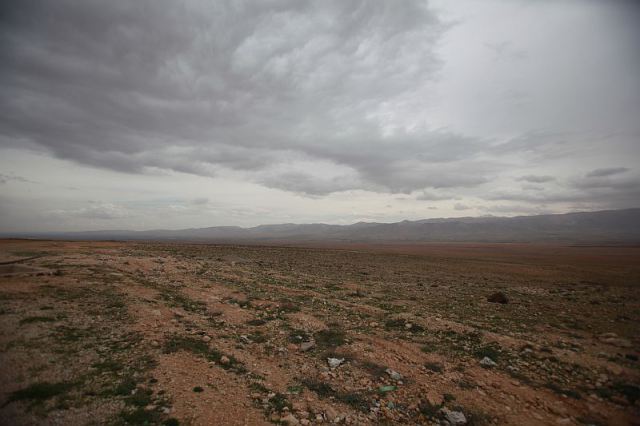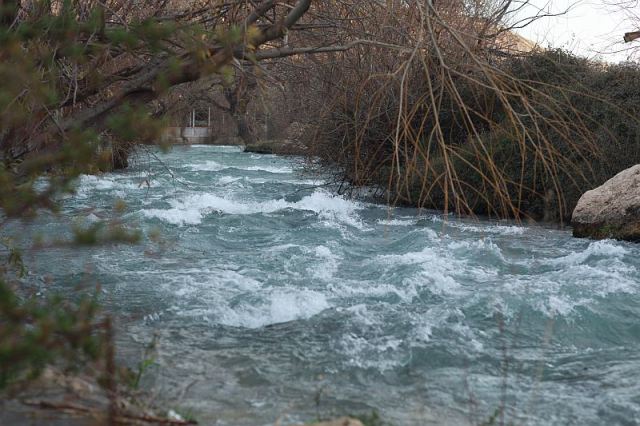|
Zobah, Beqaa, LEBANON
Filed under: LEBANON — Leave a comment
September 19, 2011

Northern Beqaa Valley
For More Photos Visit:
Beqaa Valley, LEBANON
Zoba, Zobah, Soba, Tsobah, Subutu; Assyrian
The ancient kingdom of Syria, not unlike the modern country of Syria was
divided into seven protectorates or governates. A number of these are
mentioned in the bible, including Aram-Naharaim (Syria between the
rivers) Aram Zobah, Aram Hamath, Aram Maachah, Aram Rehob, Aram Damascus.
Aram-zobah was located in the central and northern Beqaa. Although
some consider the territory to be east of the anti-Lebanese, this makes
no sense for a place of refuge for the fleeing king under Solomon 1
Kings 11. Further Zobah is connected with the Itureans (1,2) and is
confirmed by three central Beqaa towns of the governate identified
within towns mentioned in the texts of Sargon II when undertaking
primarily an action on Hamath 720BC (3). The Beqaa has a watershed south
of modern Hermel, where the springs that give rise to the nahr al-Asi or
the river Orontes. From here the waters of the Orontes rush northwards,
making this river alongside the Nile a peculiarity in the middle east.
The other river, the Litani [nah al Litani] also finds origins close to
this region, but flows south to enter the mediterranean just north of
modern Sour or biblical Tyre at biblical Misropheth-main. The Orontes
appears to be completely within the territory of Zobah with the location
of Labwa included in ancient lists, and located south of Baalbek. (3)
Zobah mentioned in Neo-Assyrian lists (4) was later attacked by
Assurbanipal c7BC (5).

Near the Source of the Orontes River
The area of Zobah in biblical terms went as far as Hamath (the governate)
and so most likely extended to the northern margins of the Beqaa to
around Kadesh. 1 Chron 18:3 Later in Israel’s history under Solomon, the
governates of Zobah and hamath were combined to form one larger state
called Aram Hamath-zobah, with the city of Hamath being the capital of
both areas, 2 Chron 8:3 [The LXX has beth-Zobah, the house of Zobah]. It
is apparent from the record of 1 Kings 11:24 that the area of Zobah was
adjacent to Damascus. Further information can be gleaned from 2 Sam 10:8
where the men of Zobah were joined with Rehob (the southern Beqaa),
Maachah (the extreme south of the Beqaa) and Tob (the lands of eastern
Golan)
There is considerable uncertainty of the location of the towns listed
within this governate. Berothai and Betah 2 Sam 8:8. I spent
considerable time in the central Beqaa viewing locations suggested by
various authors, but few made strategic sense except a small town south
of Baalbek called Britel whose elevation and location on the ancient
roman trade routes may be a possibility. These locations will be dealt
with in a future blog.
Of it’s most famous kings was Hadadezer, helped of Hadad; Hadad being
another name for Baal. (see previous article) Zobah means bright yellow,
and may reflect the colour of the wheatfields of the productive north
Beqaa, or the brightness of polished brass. It comes from a root word
meaning red or copper. It was from here that David was to aquire
“exceeding much” brass 2 Sam 8:8 “very large amount” NASB It’s name
reflects the vigour of flesh, in its energisedvitality, whether in lust
or in its military prowess. But what was to be a great challenge to
David, proved to be one of the greatest benefits, and although a
recurring enemy, the area was to provide enormous amounts of brass for
the construction of the temple under Solomon. This would be used in
vessels, and within the massive pillars at the entrance, and the brasen
sea 1 Kings 7:15; 2 Kings 23:5 Jer 52:17,20.
Two important lessons are highlighted in David’s campaign with Zobah:
1. What is achieved in the struggle with personal problems should
result in the building of ecclesias.
2. Saul was engaged with the very same enemies as David, but was
unsuccessful cf 1 Sam 14:47, 2 Sam 8:12 the recorded difference
being that David included Yahweh whithersoever he went 2 Sam 8:6,14
whereas Saul turned himself!, and then went up from following 1 Sam
14:46 and turned back from following 15:11 not following the
commandments of deity. Persistence and inclusion of deity in all our
decisions, whatever the personal cost is required for success with
deity. Rejection of the word of God leads to rejection by God 1 Sam
15:23.
One of David’s men came from Zobah, a man called Nathan (heb gift) 2
Sam 23:36 or Joel the brother of Nathan 1 Chron 11:38.
http://maps.google.com.au/maps?
1. Iturea is another name for the Beqaa with it’s capital at
Chalcis. Eupolemos who is quoted by Eseubius mentions Iturea in
relation to Zobah; Preparatio evangelica ix.30.3
2. Kraeling: Aram and Israel, The Arameans in Syria and
Mesopotamia pg 41
3. Edward Lipinski; The Arameans, Their ancient history,
culture, religion pg 319f also ISBE pg 603
4. Parpola, Toponyms pg 325
|